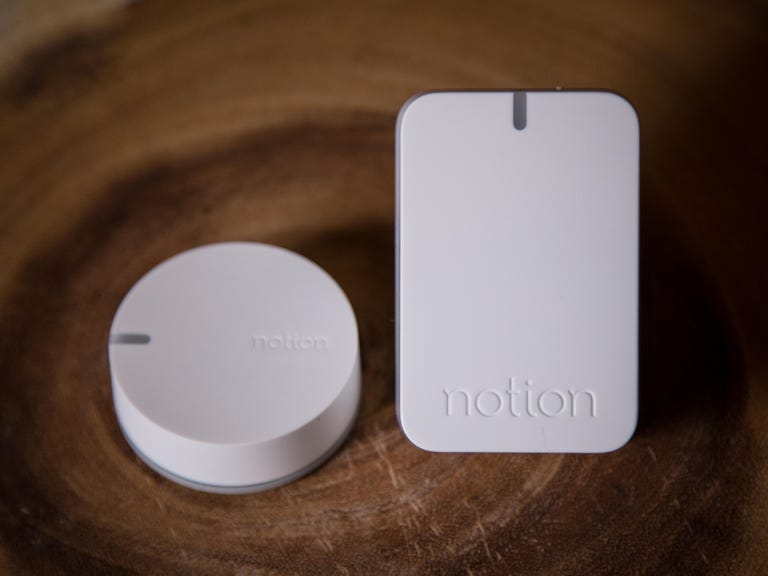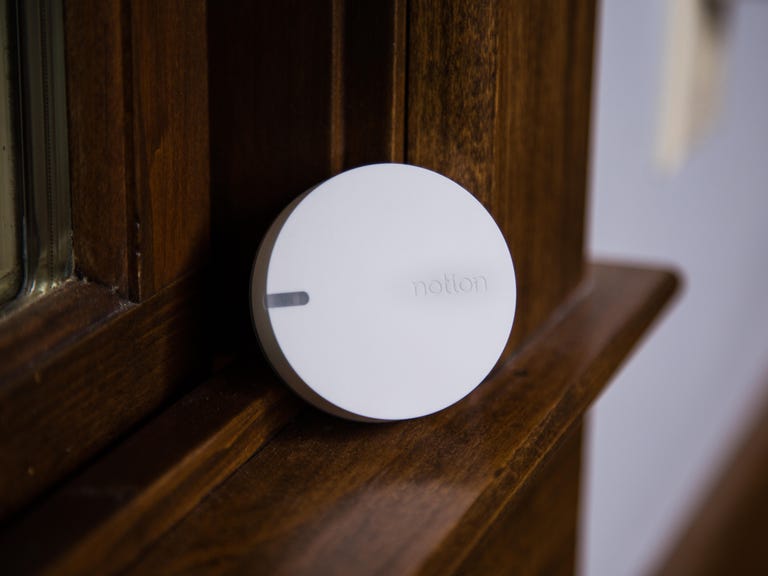 Why You Can Trust CNET
Why You Can Trust CNET Notion (second generation) review: Notion sensors work with Nest for whole home monitoring
Notion's second generation of sensors improve battery life, add Nest integration and extend range -- but customization options are still limited.

Notion's second generation of sensors look nearly identical to the first generation, but are slightly larger and work with Nest thermostats.
Notion, a smart sensor kit we tested earlier this year, has released its second generation of sensors, which add Nest integration among other things. At $219 for three sensors and one bridge, Notion doesn't offer the cheapest sensor package out there, and though improvements have been made to this next-generation product, true multitasking options are still lacking.
The Good
The Bad
The Bottom Line
The second-generation Notion sensors are noticeably larger than the first, and that's because they're powered by two AAA lithium-ion batteries. That should offer an improvement over the first generation's coin cell battery and user-reported bad battery life. It is disappointing and more than a little ironic that Notion doesn't have a way to notify you if your sensors are low on battery power.
One bridge can handle up to 15 sensors on its network. If you have a large house, you might need more. The range on these sensors is decent, but the system won't work well if the sensor and bridge are on different floors.
A single sensor costs $49 and an additional bridge costs $80. Notion's five sensor kit with bridge costs $299, and a set of three sensors alone will cost you $139. That could quickly add up if you're outfitting an entire home or every door and window.
Notion app
The Notion app delivers clear instructions to get you started with your sensors and bridge. The bridge plugs into a wall outlet and connects to your existing Wi-Fi. Sensors are added one at a time through the Notion app, by scanning a QR code on the back of each sensor. Of the three sensors I tested, one had a QR code that the app's camera took several attempts to capture. The other two worked on the first try.
Notion sensors adhere to your door, window or wall surface with a 3M adhesive sticker on the sensor's back. This second generation is also IP67 dust and water resistant with a new, thin seal around the sensor's base.
Notion sensors are now powered by two AAA lithium-ion batteries.
Notion sensors monitor the same eight things the first generation did with no new additions on that front. You'll get temperature sensing, natural frequency and sound sensing for alarm detection, light sensing, motion, acceleration and angular rate (think gyroscope) sensing for door sensors, as well as water for leak detection. You can assign each sensor multiple tasks, and that's one of the major selling points of this system.
The restrictions we saw in the first generation are still there, however. A sensor that monitors a door for opening and closing still cannot also listen for a smoke alarm. Some limitations make sense, like not being able to label a sensor for both a garage door and a sliding glass door, but I do wish the temperature, smoke and motion-sensing capabilities played better together.
You can view and adjust Nest data in the app.
The biggest advancement in this generation of Notion sensors is its integration with Nest, but it only works with iPhones and iPads. With Nest integration, you can view the thermostat's temperature and humidity readings in the Notion app. You can also adjust the temperature, see whether or not energy saving mode is enabled and receive a notification to adjust the temperature if a door or window is left open. Hopefully this feature makes its way to Android soon, because it's probably one of the biggest reasons why you would purchase Notion at all.
Notion did a good job merging Nest into its app, and it's interesting to be able to see what your Nest thermostat is reading versus what the sensor a few rooms away detects. Sensors placed on the floor and on the ceiling did measure differences, but that's to be expected since heat rises.
The discrepancy that bothered me here was when the Nest thermostat screen read 75 degrees Fahrenheit while the Nest reading in the Notion app showed 76. Yes, that's just one degree, but I expected those to be identical. Over the course of a few days, they did seem to sync up better.
I tested Notion at the front door as a motion sensor and received accurate, timestamped notifications for opening and closing. A second sensor went on the ceiling of a bedroom, near a smoke detector and delivered prompt and repetitive alerts when the smoke alarm sounded. The third sensor served as a temperature sensor and leak detector. The leak detector responded quickly to small water droplets, but I was also able to trick the sensor by using my finger to complete the circuit.
Overall, Notion did make improvements with Nest integration, sensor range and battery life. It's a step in the right direction for multitasking smart home sensors and one way to get a more detailed, whole-home picture. Many of our original gripes with this sensor are still there, however. I still wish tasks were more interchangeable, the price a bit more affordable and additional smart home integrations existed.
I'm not convinced multitasking sensors have been perfected yet. If you're interested in Notion and have an iOS device, go ahead with the three sensor bundle. You'll likely be satisfied with its design, notifications and battery life. If you're looking for something that ties into smart home platforms, there are some good specialized (and more affordable) sensors out there, such as the SmartThings Multipurpose Sensor .


